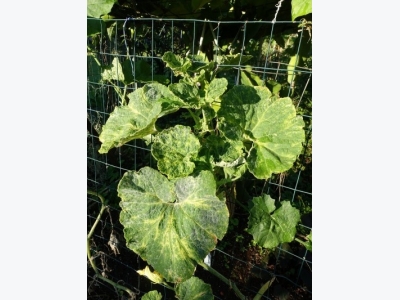Zucchini Squash Diseases: Common Diseases Of Zucchini Plants

One of the most prolific veggies is the zucchini. Just thinking of all the stuffed squash, zucchini bread, and fresh or cooked applications for the green, glorious fruits of this plant has my mouth salivating. Sadly, there are a few zucchini plant diseases that you need to watch for in order to reap that bountiful harvest. Treating zucchini diseases often starts with soil preparation, crop rotation and a little pre-planning to minimize any potential issues.
Diseases of Zucchini Plants
Zucchini plants are one of the easiest vegetables to grow. Provided with full sun, well-drained soil with plenty of organic matter worked into it and water, courgettes will faithfully produce fruit all summer long. In fact, you may be giving it to friends and neighbors because the plant produces more than you can eat.
The only things that can diminish this rampant growth are zucchini problems like insects and disease. Zucchini plant diseases usually stem from an insect vector or fungal issues. Control of insect pests and cultural care are often the key to nipping zucchini squash diseases in the bud.
Fungal diseases
Squash leaves are notoriously sensitive to powdery mildew. This is one of the most common issues with zucchini and arises when leaves get moisture on them in warm weather, which doesn’t dry off in a timely manner. This moist, warm environment allows the powdery mildew to flourish.
Other common fungal diseases that affect zucchini include:
- Downy mildew is a fungal foliar disease that creates yellow spots on leaves.
- Leaf sport Septoria, which may overwinter in yard debris.
- Gummy stem blight and black rot are self-explanatory regarding their symptoms.
- Choanephora fruit rot grows on blossoms and developing fruit, destroying their edibility.
- Fusarium is a fungal disease that can attack many types of plants. Zucchini plants will wilt and die as the disease attacks the root system.
- Anthracnose also attacks many types of plants and spreads quickly in high humidity.
Many other fungi live in soil and persist for years, blossoming and infecting plants when conditions are optimum.
Viral diseases
Viral zucchini squash diseases are often transmitted to the plant from an insect when it feeds. The usual culprits are mites, aphids, scale and thrips.
- Yellowed leaves may be a sign of a disease transmitted by aphids called Cucurbit aphid-borne yellows luteovirus.
- Cucurbit yellow stunting disorder stems from a species of whitefly and produces yellow spots and reduced flavor on fruit.
- Squash mosaic virus comes from cucumber beetles and causes distorted, brittle leaves and warped unappetizing fruits. Zucchini mosaic virus is introduced by aphid feeding.
- Bacterial wilt is also introduced from cucumber beetles. Leaves yellow and the virus clogs the vascular system of the plant.
As with fungal diseases, viral diseases are also harbored in the soil and the pests that introduce them live in the dropped leaf and plant debris in the soil.
Treating Zucchini Diseases
To avoid many zucchini issues, practice crop rotation and clean up the previous year’s debris, which may harbor disease and pests that transmit disease.
Prevent insects that introduce viruses during feeding with insecticidal soaps or quick blasts of water.
Remove the leaves that are infected with powdery mildew and other fungal diseases to prevent spread. Do not compost these, as some fungal diseases will persist.
Choose disease resistant varieties of zucchini.
Use copper dust or spray every 10 days to keep many fungal diseases in check.
Avoid watering the leaves of zucchini from above. This keeps leaves wet and allows fungal spores to bloom. Drip irrigation is more useful for target watering and to keep leaves in good condition
Related news
 Tips For Growing Cucumbers
Tips For Growing Cucumbers Cucumbers are great for pickling, tossing in salads, or eating straight off the vine.
 Fertilizing Tomatoes: Tips For Using Tomato Plant Fertilizer
Fertilizing Tomatoes: Tips For Using Tomato Plant Fertilizer Tomatoes, like many annuals, are heavy feeders and do better when provided with plenty of nutrients to grow through the season.
 Solutions For Common Problems Growing Zucchini
Solutions For Common Problems Growing Zucchini The zucchini plant is one of the most common vegetables grown in the home garden. One of the reasons is because it is relatively easy to grow.